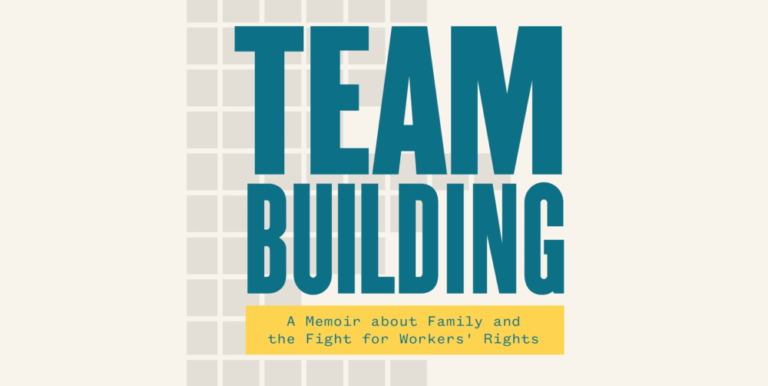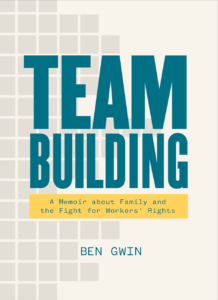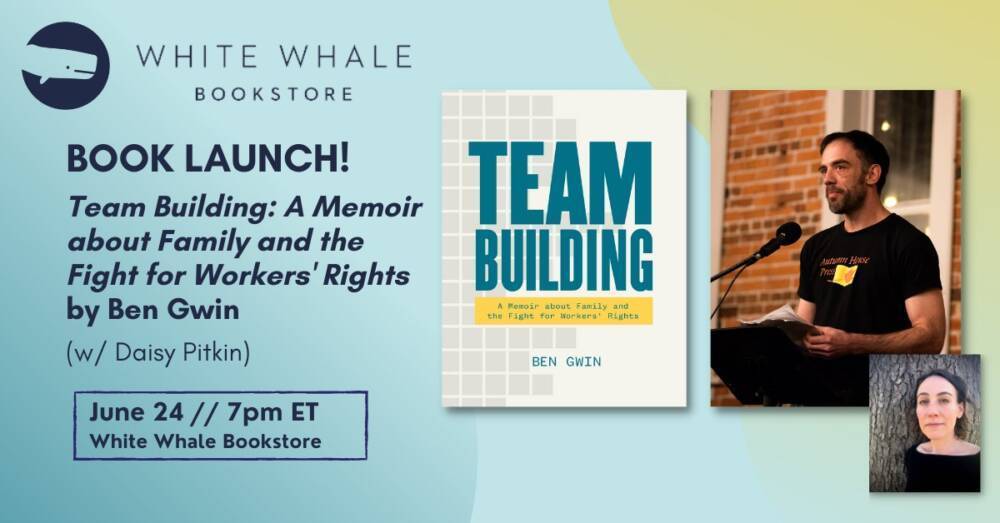“A firsthand account of the organizing effort inside one of the world’s largest tech companies and its impact on one Pittsburgh family.”
From the Publisher: “In 2019, Ben Gwin played an integral role in organizing the contract workers at Google’s Pittsburgh offices. In Team Building, he takes us inside the employees’ fight for better benefits and more flexible scheduling, offering us a candid account of today’s labor movement and the forces in America that aim to divide workers and maintain the status quo.
But this is also a personal story of struggle and triumph. As Ben works with the union, he’s suddenly faced with the prospect of raising his teenage daughter alone after her mother dies of a drug overdose. As he juggles work and the challenges of single fatherhood, he offers us a frank portrait of daily American life, where it sometimes feels like every moment is an uphill battle.
Expertly crafted and tightly structured, Team Building artfully explores the ways our working conditions reach deeply into our lives outside the office. It’s an honest and ultimately hopeful look at the importance of building solid foundations with the teams that matter most.
More info About the Author: Ben Gwin is the author of the novel, Clean Time: The True Story of Ronald Reagan Middleton (Burrow Press, 2018). His fiction and essays have appeared in the Normal School, Lit Hub, the Rumpus, and other venues. He is the editor of The Pittsburgh Neighborhood Guidebook(Belt). He lives in Pittsburgh with his daughter.
Don’t miss out: Gwin will be launching Team Building in Pittsburgh on June 24th!
Book Event “This engaging memoir goes beyond detailing a period in Gwin’s life, also offering a
forthright take on the frustrations of the contract worker. It’s an essential piece for understanding the fight for labor rights. Gwin’s resolve shines through in this moving tale.” —Philip Zozzaro, Booklist“Team Building is a fascinating and important story about work and life in the tech trenches of America today and the very real implications of corporate greed and the opioid crisis on one family in Pittsburgh. Ben Gwin gives a clear-eyed account of his time helping to organize the contract workers at Google Pittsburgh while raising his daughter in the wake of her mother’s death by overdose. With obstacles around every corner, Team Building tells the story of an unlikely victory scratched out one vote, post-softball game Wendy’s meal, or scratch single at a time.” —Dave Housley, author of The Other Ones and Massive Cleansing Fire
“Team Building strips the veneer off the tech industry and the revival it’s supposedly brought to cities like Pittsburgh. More than this, though, it shows—powerfully and intimately—how these disappointments can lead to something new: solidarity and power for workers.” —Gabriel Winant, author of The Next Shift: The Fall of Industry and the Rise of Health Care in Rust Belt America
“A must-read for anyone interested in how capitalism and the gig economy have failed us and what we can do to persevere.” —Christine Stroud, author of The Buried Return
Nine months before my surgery, I drove Gracie over to the Boys and Girls Club in Lawrenceville around 7:30 a.m. and dropped her off.
“I start my new job today, honey.” I told her. “Hopefully we can go on vacation more now. I’ll pick you up at five for softball.”
“OK,” she said. “I’m glad you’re happy, Dad.”
“I love you,” I said, and she was out the door with a wave. I watched her walk down the street, up the steps, and inside the building. Then I headed down Butler toward Stanton Avenue. Traffic wasn’t too bad when school was out for the summer. Lawrenceville was full of glossy new apartment buildings, many of which sat empty. Construction permits hung indifferently in the windows of row houses with worn brick facades. Many of the older buildings were being torn down to make room for new construction—in a suddenly chic neighborhood like this one, the lots were worth more than the buildings sitting on them.
I was doing my best to provide Gracie with stability and consistency while Jane, her mom, tried to get her own life together. Ten years of Jane’s heroin addiction, family court, and supervised visitations had worn me out, but things were starting to look better. Over the past year, Jane had been to jail, rehab, inpatient, and outpatient. But recently, she had passed every piss and hair test. And at our last hearing, the judge ordered that Gracie was to go up to Zelienople, a town thirty miles north of Pittsburgh, to see Jane every other weekend, unsupervised.
Just three years earlier, Jane had relapsed. She’d only recently been allowed to be alone with Gracie again. But now she had a good job waiting tables. And she was on state insurance that also covered Gracie. Between the insurance and child support, I was saving around $700 a month in expenses. I needed the help. The health insurance was especially important. Gracie had a ventricular septal defect and asthma. Jane’s state plan covered her heart doctor appointments and her prescriptions.
During my previous job at Thermo Fisher Scientific, it always felt like I was a whisper away from being laid off. I worked on six-month contracts, and every time one contract was running down and I hadn’t received my next one, I held my breath and started job searching until they finally renewed my position. Thermo Fisher was tough to leave because it paid well and I had time to write. Over the course of five years, I’d worked there as a contractor two different times, and I got along well with everyone. But in between those two stints, I had been laid off. When my unemployment ran out, I took a series of bad, low-paying, mostly part-time jobs until they rehired me.
I didn’t want to go through that again at thirty-eight. So in my last flurry of job applications, I had applied with HCL to work on-site at Google. The job description was similar to what I was already doing, but Google also had a reputation as a great place to work.
Even though I wasn’t technically a Google employee, I wasn’t exactly a contractor either. The company considered me a “vendor,” part of Google’s extended workforce that fell under the Temp, Vendor, Contractor (TVC) umbrella. This arrangement meant Google didn’t pay for my benefits and wasn’t responsible for my working conditions; HCL was. It also meant Google was not subject to joint employment laws. Those regulations are intended to protect workers by preventing companies from hiring temporary workers to do permanent, full-time jobs without paying them the wages of full-time workers, providing health insurance, or offering other workplace protections. On paper, Google didn’t manage vendors like me or compensate us in any way (aside from food, apparently) because that would mean they would have to give us the same benefits they gave their full-time employees. Google workers weren’t even supposed to give us T-shirts or invite us to on-site, company happy hours.
When I took the job with HCL, I only had a basic understanding of labor law, and this stuff wasn’t at the top of my mind. But it was hard to find a job with a principal employer and not through a recruiting firm. After the recession, more and more businesses started using temp agencies. Over half of Google’s workforce is made up of TVCs. It’s a model that fractures employees, keeps temporary workers in a precarious position, and keeps wages and insurance costs down. All these things make it harder to organize a union. Some agencies even just find another firm to hire the workers and do all the administrative work. They just take a cut of the money.
HCL’s recruiter, Stephen, had told me they started people off at a relatively low salary—$40,000 a year—but that they then gave big raises once new hires proved themselves. I was told I could make between $35 and $50 an hour at Google and that I would get back to my previous salary of $52,000 in a couple years. I figured that if Google was a better company to work for than Thermo Fisher, the initial pay cut would outweigh the stress that came from working from one six-month contract to the next and having to rely on the Affordable Care Act for health insurance.
I took the recruiter and the interviewing manager at face value. I felt like I was making an informed decision.
On my first day, my coworkers and I set up our workstations and then went to orientation. At orientation, we learned about our health insurance plan—a pretty good one by American standards. We were also told not to talk to full-time Google employees about anything for any reason, ever. When Nancy got to this point in the orientation, her tone grew more serious as she rattled off a list of rules:
Don’t tell anyone you work for Google. You work for HCL.
Don’t put Google on your LinkedIn or on social media. Say “HCL onsite at Google.”
You can put Senior Analyst on your résumé. After a year, you can write Lead Analyst.
Don’t stay for dinner too often, and if you do, don’t eat too much. Don’t take food home from the cafeteria.
Don’t ask your Google program manager for anything. Don’t ever talk to your Google supervisors.
Don’t talk to Google employees. Don’t ask your coworkers about how much money they make. (It is illegal to forbid salary discussions in the workplace, but we eventually found that this rule against discussing salary was listed in our elusive online employee handbook. I didn’t find out about it for months, before the line mysteriously vanished.)
Don’t sit in the same place for too long—the Googlers might want to sit there, and we don’t want to take up too much space. Try to stay at your desk for most of the day, but feel free to walk around with your laptop to one of the lounges or other workstations.
Aside from four hours of annual online training, you can’t work from home under any circumstances. We do offer flextime. You can’t work four tens, but you can work four nines and a four. I really love the flexibility. You’ll see everyone leaving around noon on Fridays. It’s great.
Don’t come into work before 7:00 a.m.
Don’t stay in the office later than 7:00 p.m.
There is no overtime under any circumstances.
Don’t walk too fast past Googlers.
Don’t talk too loud near Googlers.
If you have a problem with any full-time Google employees, the FTEs, go to your manager and they will escalate the issue to Google HR if necessary. Don’t go to Google yourself.
You have three free hours of parking in the garage, but you are not allowed to leave and come back continuously throughout the day. Don’t take up the FTEs’ parking spaces.
We have ten paid holidays. There are two unpaid holidays when the office is closed, and we don’t get paid time off: those days are MLK Day and Presidents’ Day. On those two weeks, everyone works thirty- six hours in four days and uses four hours of PTO. Or you can use a full day of PTO and work thirty-two hours. It’s not so bad. There’s nothing we can do about these rules. Google enforces them.
We have a chat for funny memes. Feel free to share memes. It’s fun!
We all sat quietly, still half-enthralled by the decadent office, the average health insurance, and the above average free food. At Thermo Fisher, I had kept a loaf of bread and a jar of peanut butter in my cubicle for lunches, along with a box of Clif Bars for breakfast. Burnt breakroom coffee did the job. Every Thursday, I’d get a salad from the cafeteria and a Starbucks coffee with the other contractors. We’d walk around outside, smoke cigarettes, and complain about our boss. We would share notes on our individual progress, and we always made sure to hand in our weekly quota of spreadsheets at the same time so that no one was going too fast. We needed the work to last as long as possible while still hitting our deadlines. I wondered how the day-to-day work was really going to play out at Google.
“What about our raises?” I asked. “How much are they?”
“It depends on your performance,” Nancy said.
“Can you ballpark it?”
“I don’t know. It varies.”
After orientation, we went to lunch. Sam, Bobby, and I all agreed the job seemed shadier than we had initially thought, but we conceded that the free food was great. I had a sandwich and a salad. The three of us sat together and talked about our past jobs, why we’d taken this one, and how over-the-top the office was. We talked more about the interview process and how off-putting the recruiter had seemed to us in retrospect.
After lunch, it was time for the tour.
We passed the nap rooms and the library and came to an open workshop in the back with 3D printers and other robotics stuff people could use to do their own work after hours. Then there was a big climbing net and some weird tubes like the kind they have at Chuck E. Cheese. This led into the music room and then the ping-pong room. I was worried I’d get lost one day and accidentally walk into a sex robot room. I had no idea where I was in relation to my desk.
We finally came out on an empty corridor lined with cubicles on both sides. When I saw them, I suddenly longed for my boring Thermo Fisher office out by the airport, where I’d watch the planes take off from the window seat I had maneuvered into over the years—my own space. My first day at Google wasn’t half over yet, and I was already regretting my decision. I felt like I’d given my bank account info to a former Nigerian prince. All the window dressing was insulting for a job that paid $19 an hour. The perks were there to keep the high-priced talent happy and on-site. HCL used them to subsidize low pay.
This excerpt is published here courtesy of the author and publisher and should not be reprinted without permission.



























